Mr. Sandman Cometh:
Adam Sass on YOUR LONELY NIGHTS ARE OVER
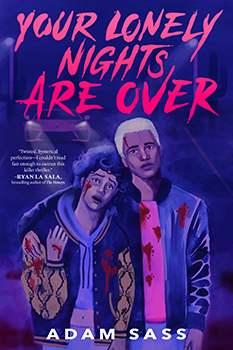 Adam Sass knows a thing or two about breaking rules. A one-time Starbucks barista at his (then) local Barnes & Noble, he could often be found scrawling stories on pastry bags with a Sharpie. Fast forward a decade and a half—and a variety of pursuits, from acting/improv comedy and freelance journalism to screenwriting and marketing, later—and he now writes critically acclaimed, refreshingly inclusive novels for young adults. These include both thrillers (his 2020 debut, Surrender Your Sons, which won the IPPY Gold Medal Award for YA Fiction) and romantic comedies (The 99 Boyfriends of Micah Summers, which was named a Best Book of 2022 by Seventeen Magazine and The Children’s Book Council)—and led School Library Journal to proclaim: “Sass has undoubtedly joined the ranks of breakout queer YA authors.”
Adam Sass knows a thing or two about breaking rules. A one-time Starbucks barista at his (then) local Barnes & Noble, he could often be found scrawling stories on pastry bags with a Sharpie. Fast forward a decade and a half—and a variety of pursuits, from acting/improv comedy and freelance journalism to screenwriting and marketing, later—and he now writes critically acclaimed, refreshingly inclusive novels for young adults. These include both thrillers (his 2020 debut, Surrender Your Sons, which won the IPPY Gold Medal Award for YA Fiction) and romantic comedies (The 99 Boyfriends of Micah Summers, which was named a Best Book of 2022 by Seventeen Magazine and The Children’s Book Council)—and led School Library Journal to proclaim: “Sass has undoubtedly joined the ranks of breakout queer YA authors.”
If those books put him on the literary map, then September’s YOUR LONELY NIGHTS ARE OVER is destined to become the stuff of legends. Inspired by crimes and criminals, both real and imagined, the title breaks convention by putting two lusty-yet-lonely gay besties with (occasional) benefits up against a long-dormant killer known as Mr. Sandman. This faceless foe terrorized San Diego from 1971 to 1975, leaving behind the bloodied bodies of the lovelorn and downtrodden—and becoming a catalyst for the rallying cry: STAY TOGETHER. Then, he disappeared.
Nearly fifty years later, a true crime docuseries appears to bring Mr. Sandman out of retirement—and, this time, he’s targeting members of Stone Grove High School’s Queer Club. Suspicion immediately falls on BFFs Dearie and Cole, who are both a part of the community and outliers, given their loud and proud approach to casual sex. Will the two survive, and with their friendship intact—or will they become the latest victims in Mr. Sandman’s devious and deadly resurrection?
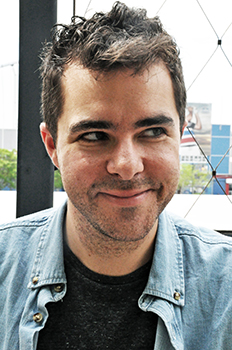
Now, Adam Sass clues us in on his hot new horror novel, YOUR LONELY NIGHTS ARE OVER, and its unashamedly rule-defying co-leads, who he fondly calls the Final Gays …
YOUR LONELY NIGHTS ARE OVER pays homage to slashers like Halloween and Scream and even infamous true crime cases such as Zodiac. What cultural touchstones most inspired you during the generative process, and how did you endeavor to take the familiar and give it a fresh twist?
I wanted LONELY NIGHTS to channel the kinds of horror that got me hooked as a kid. That’s why the cover purposely evokes Christopher Pike and Fear Street novels, with its hot pink jagged font and cool teens looking frightened in an ominous dark parking lot. That also includes a lot of 70s through 90s VHS horror I dove into at Blockbuster and local family video spots. I was insatiable for the stuff. When crafting this story, the humor and personality of those 90s slashers had to be in place, not to mention those killer (haha) soundtracks. In particular, Halloween (and II and H20) live permanently in my creative headspace. That’s how I came up with the title and the name of the killer, Mr. Sandman—the spooky 50s jingle that plays throughout that series.
On the real-life front, the Zodiac was one inspiration for Mr. Sandman in that he was never caught. In my story, the killer loomed large in the American psyche in the 70s but had since gone underground. I became obsessed with the idea that a long-retired killer would be lured out of hiding when a true crime docuseries reminded him of the good ol’ days.
Your killer(s), Mr. Sandman, is targeting members of Stone Grove High School’s Queer Club—a threat that seems to come from within. How did focusing on an insular group allow you to illuminate the ways in which such communities can undermine their own, even as they’re subjected to external prejudice and scrutiny?
LONELY NIGHTS was always going to be about how the queer community is exhausted from fighting—every day, there are external dangers and internal ones. The U.S. has a political climate that is increasingly hostile to LGBTQ+ young people, so I thought an on-campus queer club of ten people—some friends, some enemies, some ex-lovers, and everything in between—would make them an irresistible target for this killer who snuffs out lonely, desperate people. When you’re queer and young, and you have no choice but to make do in these small, conservative towns, knowing only a handful of other queer people (who you might not like!), you become very desperate. Some people in the community start pointing fingers at others and accusing their behavior, personality, or identity as being the reason ALL are being attacked. I don’t think I could honestly tell the story of a Queer Club being attacked from outside without showing the breakdown within. We have these interpersonal differences, and when we’re attacked from outside, we have to choose between banding together…or getting slaughtered.
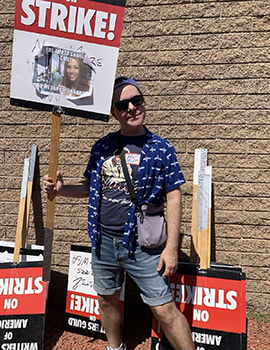
© Rebecca Kirsch
While your last book, The 99 Boyfriends of Micah Summers, was a rom-com, this one could also be considered a love story, albeit a (mostly) platonic one between best friends. Tell us about the unique dynamic you established between Dearie and Cole and the ways in which this is tested as paranoia and suspicion set in.
Dearie and Cole aren’t your typical Final Girls (final gays?). In Scream, they lay down the rules that the survivors always tend to be virgins—so-called “good girls.” In LONELY NIGHTS, I wanted to break that rule wide open and focus on two out, proud, and sexually active teens as the ones who persevere. They experience slut-shaming from their peers in the club, and even from the killer, who starts planting evidence that point to Dearie and Cole as the suspects. The killer rightfully assumes that the club’s animosity (and a splash of jealousy) over Dearie and Cole rejecting relationships in favor of hookups would make them easily believable as monsters. And it works.
But Dearie is vulnerable to wanting to be seen as “good.” When the trouble starts, he loses his confidence in being himself. He gets in a monogamous relationship with another boy because he believes that’s what will save them both. However, Cole doesn’t bow to this pressure, but he pays the price as the fingers point harder and harder at him. Dearie and Cole’s friendship is the most important gay relationship I’ve ever written, and their bond coming under attack is scarier to me than any of the horror elements. That’s because a lot of their friendship was based on a lot of the conversations had by me and my best friend, Terry J. Benton-Walker, the author of Blood Debts.
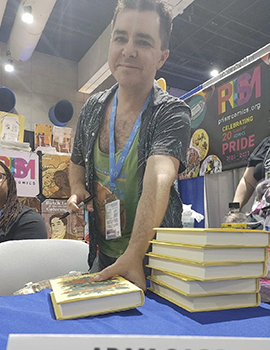
© Catherine Griffith
Speaking of Dearie and Cole: you alternate their POVs throughout the narrative. How does this structure enhance the story’s substance and suspense, and in what ways does seeing each character from the other’s perspective allow for deeper character development?
Dearie and Cole begin the story as besties, but that gets strained, and as their relationship gets more challenged, the more their point of view chapters diverge. The sharing of information and clues between the two of them is easy at the beginning when they’re in the same space. However, as they’re torn apart and are forced into separate locations (and investigations), the suspense builds because they stop having access to the other’s information. It makes them easier targets for the killer.
Through the dual POV, the killer literally divides the boys so they can’t help each other—and soon, only the reader holds all the facts, so they become doubly desperate to see Dearie and Cole reunite. It strengthens their character development because Dearie gets further manipulated, and Cole gets further bitter about his friend. It’s only once the POVs start to converge again that both realize how much they need the other to view reality correctly. How could we see our way through our worst crises without friends?
The story feels very timely without being beholden to a specific moment. What was your approach to establishing a contemporary vibe (by use of current events, pop culture, technology, etc.) without risking imminent datedness?
Timelessness always requires a deft touch, especially in stories that focus on queer people. Our lives, our well-beings, they all change year by year, sometimes month by month. We are always in a shifting, volatile social situation—a perfect backdrop for suspense! In writing for timelessness, I try to lean on elements of queer life I believe will always be with us: the importance of friends and community, our alienation from straight society despite our best allies, our always-loaded relationship to sex and dating, and our reliance on humor to digest traumatic events. The rest of the time, I try not to name specific apps or brands. Anything that could be gone tomorrow!
You have an interesting background that includes screenwriting, acting, improv comedy, and even marketing. In what ways do you find yourself drawing on those experiences, not only in terms of story development (with lively dialogue and interplay) but more pragmatic concerns such as mass sales appeal?
In writing for timelessness, I try to lean on elements of queer life I believe will always be with us: the importance of friends and community, our alienation from straight society despite our best allies, our always-loaded relationship to sex and dating, and our reliance on humor to digest traumatic events.
I pride myself on my dynamic skillset. Writing is one of the best jobs there is because every possible skill a person can have could be an asset. My improv background certainly helps me create indelible characters that feel, talk, and act real, which is so important in thrillers because you don’t want to see anything bad happen to them. Practically, marketing is a key skill because even authors at big publishers are being tasked with marketing themselves to some degree these days.
That’s also where my acting and improv experience comes into play because I’m always pitching myself and my work. On tour stops, you have to work a crowd and keep them engaged because sometimes the group is shy, or maybe doesn’t know who you are, and you have to work a bit harder to put on a show. I believe strongly in showmanship. Readers are paying 20 to 40 bucks for your book when there are thousands of others to buy; they’re leaving work early or not going to a party, just to drive across town (or to another town) to see you and hear you talk about your work. Gratitude for that—if the crowd is only a few people or a whole room—is what I lead with. My showman credentials planted that in me.
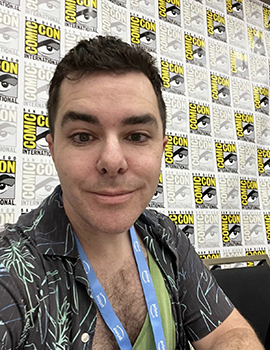
© Catherine Griffith
As a proud member of the LGBTQ+ community, what do you hope your work might contribute—both within the community itself and to those who may only experience the queer coming-of-age experience vicariously?
I hope this helps queer people—even young queer people—feel less lonely. I hope they learn to lean on their friends and not make their whole lives begin and end with a relationship (which is very wonderful, but you can be perfectly happy without ever having one). Also, I’d like young queer people to walk away from this book feeling less slut-shamed—that you can safely have multiple partners, and as long as you’re treating them respectfully, you’re no “better or worse for the community” than your friends who want to be in monogamous relationships or single. I want queer people to have that freedom of choice.
Leave us with a teaser: What comes next?
In July 2024, my fourth YA book is coming out, a romance called Cursed Boys and Broken Hearts. While it’s not a thriller, it’s steeped in darkness; it’s almost a gothic romance. In fact, I pitched this as Daphne du Maurier’s Rebecca for teens. In Cursed Boys, Grant Rossi is recovering from yet another failed relationship—he feels cursed to always be the starter boyfriend for guys who dump him to land their true love somewhere else. To escape his depression spiral, he runs off to the countryside where he spends the summer with his Italian aunt in her crumbling bed & breakfast and vineyard. He used to spend every summer there as a kid until he had a disastrous falling out with Ben, his childhood friend he was in love with (who Grant believes started his “curse”).
To save the B&B, Grant is tasked with working with a local gardener to repair the place—but it turns out, the gardener is Ben…all grown up and looking great. It’s a twist on Beauty and the Beast (with Grant as the Beast), all about letting go of the past and how to fall in love when you feel totally unlovable. It’s a very personal story because the house I based the B&B on is my grandparents’ home, where I spent a lot of summers growing up. Sadly, we lost that house, but writing Cursed Boys was my chance to create a reality where the gay boy gets to save everyone.
Adam Sass on YOUR LONELY NIGHTS ARE OVER











